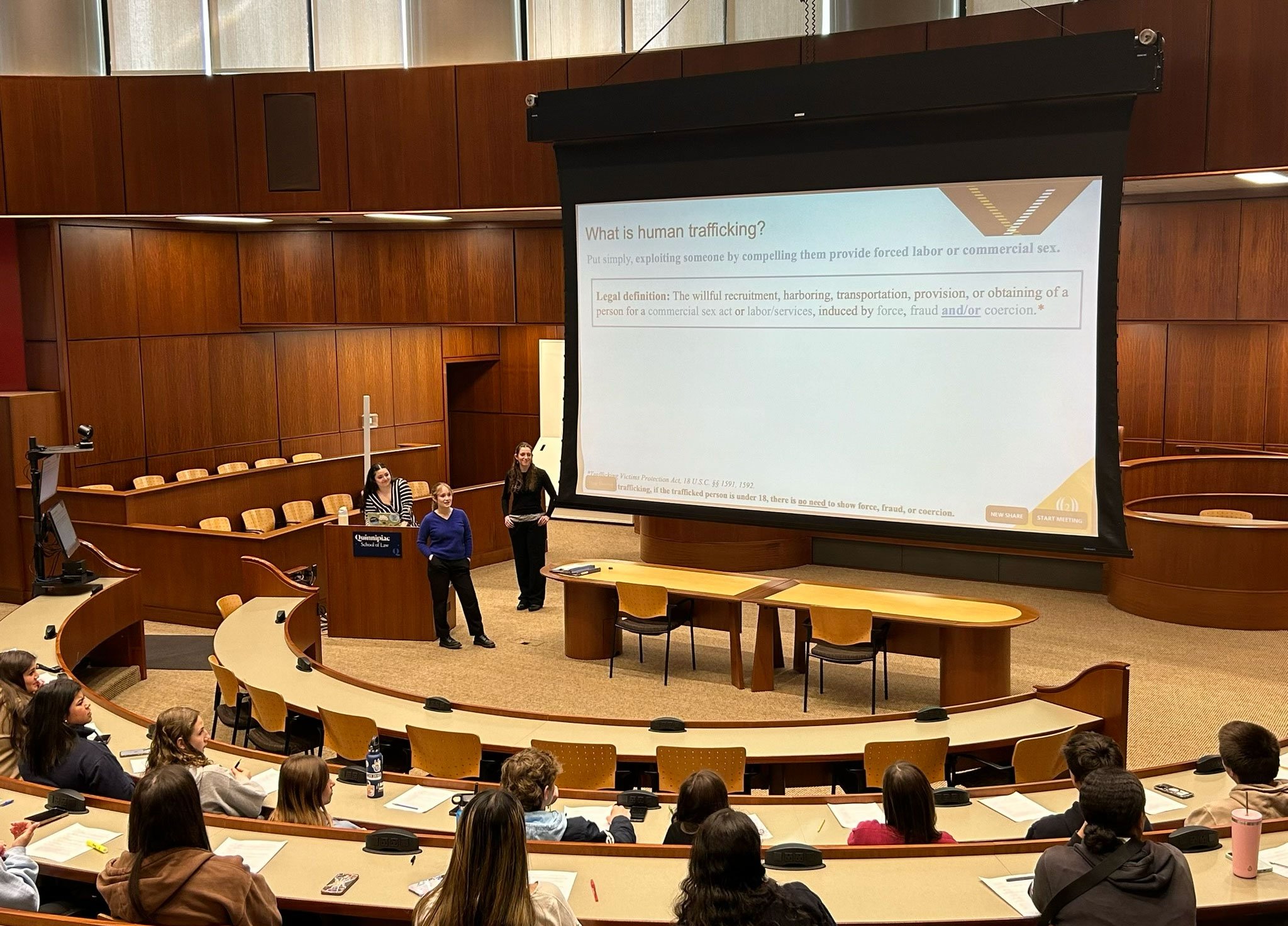
Quinnipiac Human Trafficking Prevention Project imparts important lessons to visiting high schoolers
April 30, 2024

April 30, 2024

On April 19, students from Quinnipiac School of Law’s Human Trafficking Prevention Project (HTPP) imparted important lessons to 30 local high school students during a trafficking awareness and prevention training session in the Brooke A. Goff Courtroom on the North Haven Campus.
In partnership with Quinnipiac’s Civil Justice Clinic, HTPP is a student-led organization that helps raise awareness about human trafficking by offering free trainings and on-campus events.
The goal is to reach and teach diverse audiences to identify and respond to situations of human trafficking, and ultimately make a difference in the lives of victims and survivors of trafficking.
The HTPP team is advised by Quinnipiac clinical professor of law Sheila Hayre. Hayre also supervises law students in the Civil Justice Clinic who represent, among others, clients who have been labor or sex trafficked.
HTPP training chair and second-year law student Lindsey Hernandez said one of the team’s goals this year is to go beyond stereotypes by highlighting the varieties of trafficking as well as who can be targeted by sex and labor traffickers.
“We’ve been spreading the word on labor trafficking and that sex trafficking also happens to men and boys; and that although we have statistics, they might not really reflect the reality,” said Hernandez.
Students visiting from The Morgan School, a public high school in Clinton, Connecticut, received training provided by Hernandez and the HTPP team, which included second-year law students Faith Hasher, Kate Torres, and Heather Mansfield, as well as HTPP student member Laura Ospina of Yale University.
Quinnipiac School of Law alumna Brittany Eckard, JD ’23, an immigration attorney, also assisted with instruction.
Using case examples, short videos, slides, and even a pop quiz, the HTPP team illustrated examples of sexual exploitation of children (under age 18) and discussed how traffickers use force, fraud, and/or coercion across a range of trafficking scenarios.
Encouraging open discussion, they worked with the high schoolers to identify and learn to avoid situations which could result in trafficking; provided resources where the students themselves or their friends could get help; and shared ways to safely report suspected trafficking.
The Morgan School teachers Rachel Lupone and Rachel Shook said the sobering statistics and important information the HTPP team imparted to their students was meaningful and necessary.
“We want them to have a better understanding of what human trafficking is; and also knowing the signs, and how they can actually identify someone who’s being trafficked, and what they can do to help,” said Lupone, a health teacher.
Shook, a history teacher, offers an introduction to criminal law course at The Morgan School that touches on human trafficking.
“At the beginning of the semester, most of the students don’t even know human trafficking is happening in the United States, in all 50 states, let alone in Connecticut,” said Shook. “So I think it’s really important for them to come here and experience this and learn more about it.”
Lupone connected with Hayre and the HTPP students over a year ago through the team’s outreach efforts.
“The law students, as a group, have been so passionate about this topic and spreading awareness and making connections with us and others. They’re so professional, eager to help, and easy to work with. They are really amazing,” said Lupone.
Following the morning training session in the Brooke A. Goff courtroom, the HTPP team led break-out sessions and a tour of the School of Law.
Shook said the preparation and care the HTPP team put into the day’s presentation and School of Law visit will be memorable for the high school students.
“I think that having this information come from students who are close to the age of our students helps to drive home the points, because its coming from people who are on their level who are clearly informed and passionate about these issues,” said Shook.
Quinnipiac Today is your source for what's happening throughout #BobcatNation. Sign up for our weekly email newsletter to be among the first to know about news, events and members of our Bobcat family who are making a positive difference in our world.
Sign Up Now